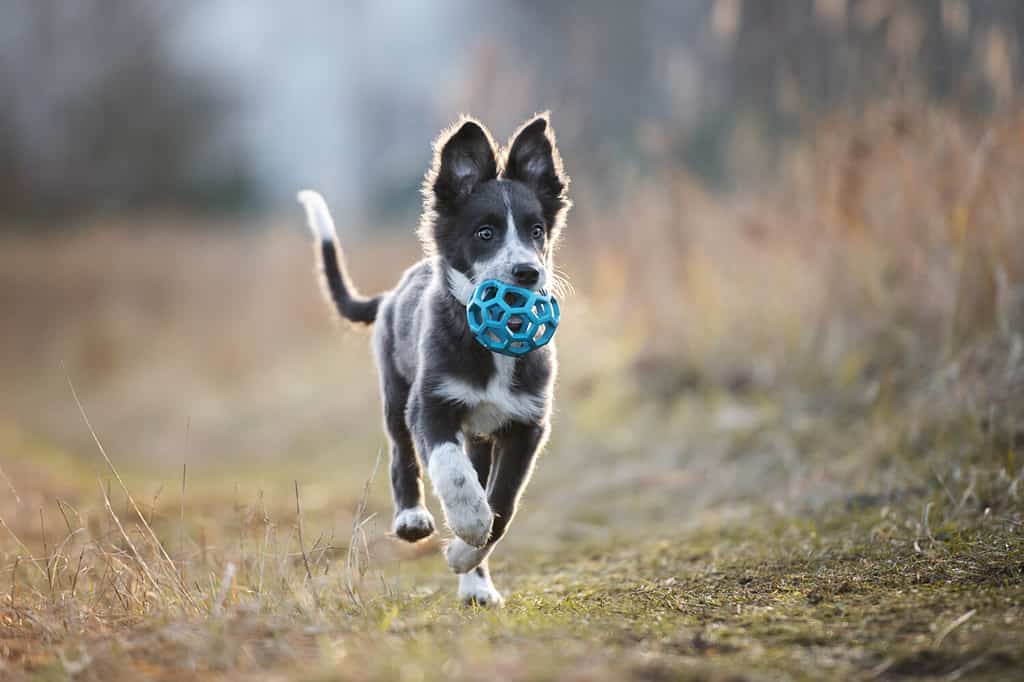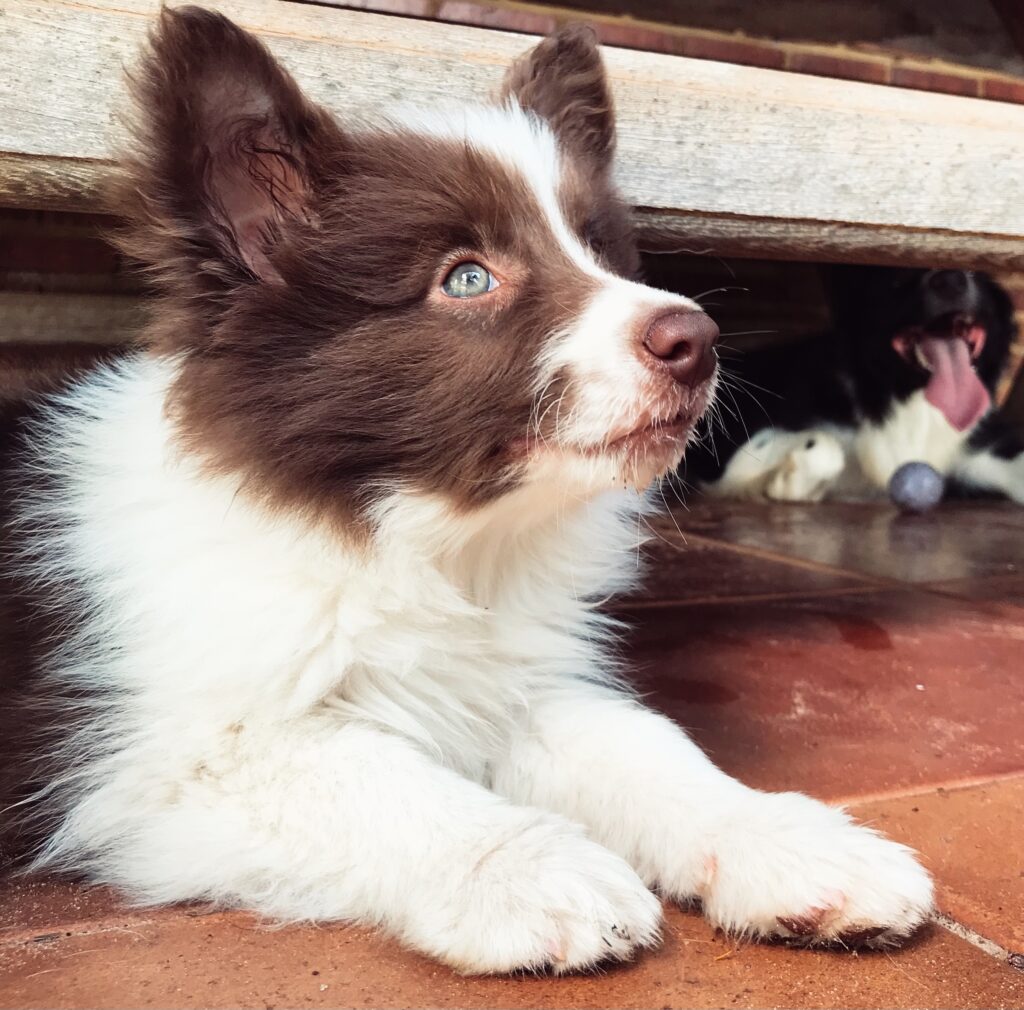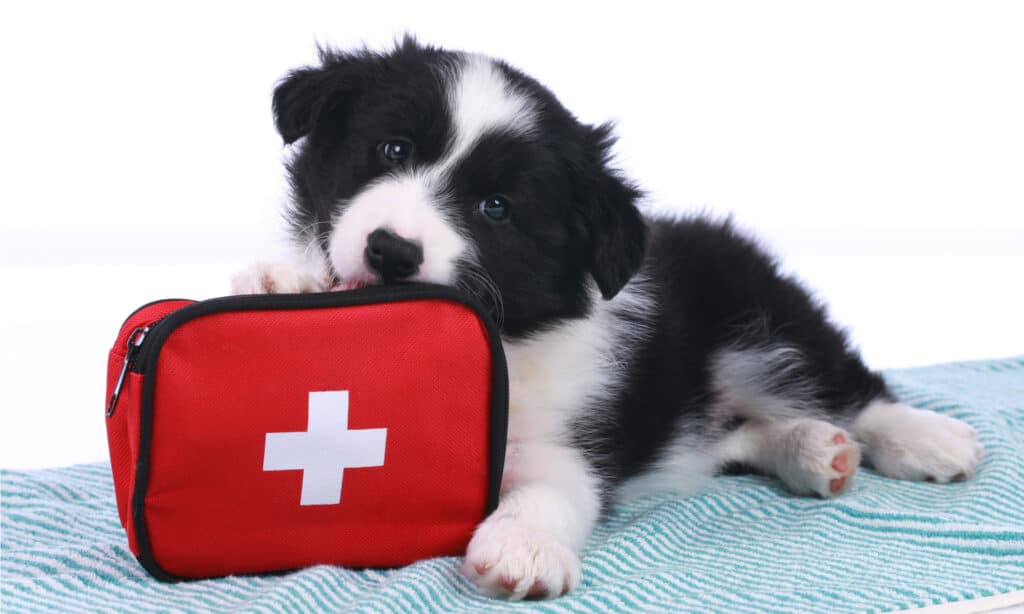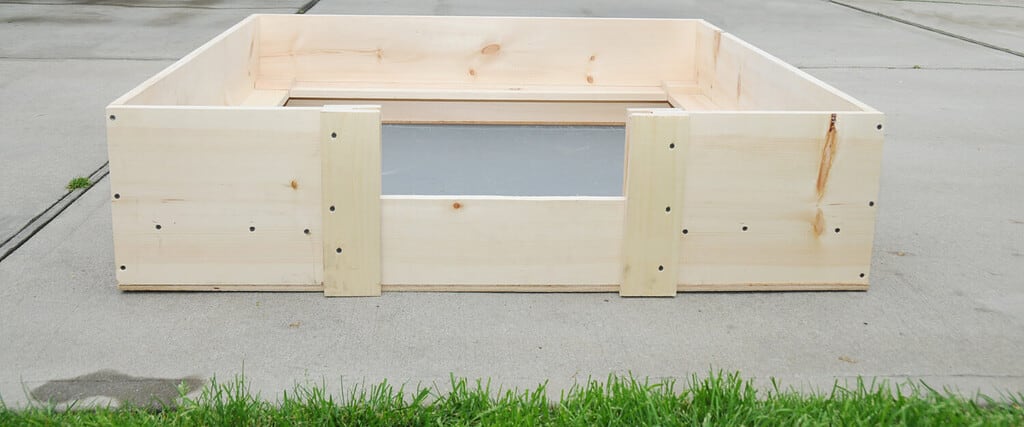Welcome to our guide on border collie pregnancy, where we will be discussing the gestation period, weekly milestones, and care needed for your furry friend during this exciting time. As a responsible dog owner, it is essential to understand the various stages of pregnancy and provide adequate care for your beloved pet. In this article, we aim to provide you with all the information you need to ensure that your border collie has a healthy pregnancy journey. From understanding the length of their gestation period to recognizing critical developmental milestones along the way – we have got you covered! So sit back and relax as we take you through an informative guide on caring for your pregnant border collie.
Border Collie Summary

Border collies are pregnant for nine weeks.
©StunningArt/Shutterstock.com
The border collie is a highly intelligent breed of dog that was originally bred for herding livestock, particularly sheep. They are known for their incredible work ethic and ability to learn complex tasks quickly. Border collies have a compact and athletic build, with long hair that can be either smooth or rough.
In terms of temperament, border collies are incredibly loyal and devoted to their owners. They love nothing more than pleasing their human companions and will go to great lengths to make them happy. However, they also require a lot of exercise and mental stimulation in order to stay healthy and happy.
As far as health concerns go, border collies can be prone to certain conditions, such as hip dysplasia and eye problems like cataracts. However, with the right care (including regular veterinary check-ups), most border collies can live long and healthy lives.
Overall, the border collie is an amazing breed of dog that requires a committed owner willing to provide plenty of exercise and attention in order for them to thrive both physically and mentally.
Border Collie Pregnancy Symptoms

Border collies give birth to between for and eight puppies per litter.
©Koen Adriaenssen/Shutterstock.com
If you suspect that your border collie may be pregnant, there are several signs and symptoms to look out for. The most obvious indicator is a missed heat cycle, which typically occurs every six months. Additionally, you may notice changes in your dog’s behavior or appetite. Some border collies become more affectionate or clingy during pregnancy, while others may experience nausea and have trouble eating.
Physical changes are also common during pregnancy. Your dog’s nipples will likely swell and darken as they prepare for nursing puppies. You may also notice weight gain and a larger abdomen as the pregnancy progresses.
It’s important to note that not all dogs show obvious physical or behavioral symptoms of pregnancy early on. If you suspect that your border collie is pregnant but aren’t sure, it’s best to consult with a veterinarian who can confirm the diagnosis through ultrasound or other tests.
Overall, being aware of these potential symptoms can help you provide the appropriate care and support for your beloved pet throughout her pregnancy journey.
Gestation Period: How Long Are Border Collies Pregnant?

Border collie puppies nurse for around ten weeks.
©Alex Manders/Shutterstock.com
The gestation period for a border collie typically lasts around 63 days, which is consistent with the average length of pregnancy for most dog breeds. During this time, it is important to provide your pregnant border collie with proper care and attention to ensure that both she and her developing puppies remain healthy.
As the due date approaches, you may notice changes in your dog’s behavior and physical appearance, such as an increase in appetite or weight gain. It is also essential to have regular check-ups with your veterinarian throughout the pregnancy to monitor the health of both mother and pups.
Additionally, preparing a comfortable birthing area for your border collie is crucial for ensuring safe delivery. This should include a clean space with plenty of blankets or towels for warmth and comfort during labor.
Pregnancy Care for Border Collies

It is crucial that your border collie gets adequate nutrition during pregnancy.
©Susan McQuade/Shutterstock.com
Taking care of a pregnant dog, especially a border collie, involves some additional considerations and precautions. One of the most important aspects is ensuring that the dog receives proper nutrition throughout her pregnancy. This means providing high-quality food that is rich in nutrients such as protein, calcium, and vitamins.
It’s also essential to monitor the dog’s weight gain during pregnancy to ensure she is neither gaining nor losing too much weight. A sudden increase or decrease in weight can be an indication of health problems for both mother and puppies.
Regular veterinary check-ups are crucial during pregnancy to detect any potential issues early on. The vet will perform ultrasounds to check on the growing pups’ health and identify any complications that may require medical intervention.
Another critical aspect of caring for a pregnant border collie is exercise management. While it’s essential to keep your dog active during this time, excessive exercise can pose risks to both the mother and the puppies. It’s best to consult with your veterinarian regarding appropriate physical activities based on your dog’s individual needs.
In summary, taking care of a pregnant border collie involves monitoring their diet and weight gain/losses closely while ensuring they receive regular veterinary check-ups along with appropriate exercise management based on each individual case – all while keeping a watchful eye out for any potential complications that may arise along the way!
Average Litter Size
Border collies have an average litter size ranging from 4 to 8 puppies. However, it is not uncommon for a border collie to have a smaller or larger litter than the average range. Factors such as the age and health of the mother dog, genetics, nutrition, and breeding practices can all affect litter size.
What to Expect in Week 1
During week one of your dog’s pregnancy, there may not be any visible changes in her physical appearance or behavior. This is because during the first week, fertilization has just occurred, and the fertilized egg is beginning to divide into multiple cells as it travels down the fallopian tube toward the uterus.
However, it is important to start taking good care of your dog from this very early stage of pregnancy. You should ensure that she receives a balanced diet with all the necessary nutrients and vitamins for a healthy pregnancy. Additionally, you should monitor her closely for any signs of illness or discomfort, as these could affect both her health and that of her developing puppies.
At this point, you can also start thinking about preparing for the upcoming birth by creating a comfortable space where your dog can rest and nurse her puppies when they arrive. This could include setting up a whelping box with soft bedding materials and making sure that it is located in a quiet area away from any disturbances.
What to Expect in Week 2

Border collies can lose their appetite as their pregnancy stomach becomes bigger.
©otsphoto/Shutterstock.com
During week 2 of a border collie’s pregnancy, there are some key changes that owners should be aware of. At this stage, the fertilized eggs will begin to divide and form embryos which then travel down the fallopian tubes toward the uterus, where they will eventually implant themselves in the uterine lining.
It is recommended to limit your dog’s exercise routine during this time, as strenuous activity could potentially harm developing embryos. Gentle walks or light playtime with other dogs are still encouraged, though. Just make sure to keep an eye on her energy levels.
What to Expect in Week 3
During the third week of a dog’s pregnancy, which is commonly referred to as the nidation phase, significant changes are taking place within the mother’s body. Nidation refers to the process by which fertilized eggs implant themselves into the lining of the uterine wall. This is a crucial stage in a dog’s pregnancy because it marks the beginning of embryonic development. The new puppies are safe and protected by a membrane that offers them a full course of nutrients from their mother.
At this point, you may not notice any visible physical changes in your border collie. However, behind-the-scenes hormonal shifts and cell division are occurring at lightning speed as your dog’s embryos begin to take shape.
It is important during this phase to maintain a calm and stress-free environment for your pregnant pooch. Avoid any activities or situations that could cause her undue anxiety or fear. Additionally, be sure to provide her with plenty of nutritious food and clean drinking water so that she can support herself and her growing litter.
What to Expect in Week 4

Several small meals per day can help with upset stomach during pregnancy for your border collie.
©Bettina Herrmann/Shutterstock.com
During week four of a dog’s pregnancy, it is recommended to schedule a prenatal vet visit. This appointment can confirm the pregnancy through either an ultrasound or blood test. It is important to have this confirmation as early as possible in order to begin planning for the upcoming birth and ensuring proper care for both the mother and puppies.
The veterinary professional will also be able to provide you with a reliable due date for when the puppies are expected to be born. This information is crucial in preparing for their arrival and making sure that everything is ready before they arrive.
In addition, during this appointment, the vet may also warn you about any potential abnormalities or complications that may arise during the course of your dog’s pregnancy. Being aware of these possibilities ahead of time allows you to take preventative measures or prepare accordingly if necessary.
Overall, scheduling a prenatal vet visit during week four of your dog’s pregnancy sets you up for success in caring for your furry friend throughout her gestation period and ensuring healthy outcomes for all involved.
What to Expect in Week 5
During the fifth week of your border collie’s pregnancy, significant developments are taking place. The embryogenesis stage has come to an end, and the embryos have now developed into fetuses. During this phase, body organs are starting to form, which will contribute significantly to the growth of your puppies in the coming weeks.
One important aspect of this period is that your border collie will begin to put on weight rapidly. This weight gain is a natural part of pregnancy and indicates healthy fetal development. However, it is essential for you as a pet owner to manage this weight gain carefully.
To ensure that your dog receives adequate nutrition during her pregnancy, it is highly recommended that you consult with a veterinarian regarding dietary requirements. Your vet can recommend specific foods or supplements tailored towards pregnant dogs’ needs and advise you on how much food should be given at each mealtime.
What to Expect in Week 6

Border collie puppies are well worth the wait!
©xkunclova/Shutterstock.com
During week 6 of a border collie’s pregnancy, significant developments can be observed in the puppies’ growth. At this stage, various body organs and tissues are becoming more distinct, including their claws. To ensure that both the mother dog and her growing puppies receive adequate nutrients, it is important to adjust their diet with higher energy levels as well as increased protein and mineral content.
Although you may notice a decrease in your pet’s appetite during this time, it is likely due to discomfort resulting from the pregnancy rather than any lack of interest in food. Ensuring that your dog consumes the right foods throughout her pregnancy period is crucial for maintaining good health for both her and her developing pups.
To encourage healthy eating habits during this phase of gestation, providing several smaller meals throughout the day instead of two larger ones can help alleviate some discomfort while ensuring proper nutrition intake. By taking these steps to care for your pregnant border collie properly during week six and beyond, you can help promote optimal health outcomes for both mom-to-be and her precious litter on the way!
What to Expect in Week 7
As the border collie pregnancy enters its seventh week, the growth and development of the soon-to-be pups enter a crucial stage. By this point, their skeletons are fully formed and can be clearly seen through ultrasound scans. This marks an important milestone in terms of monitoring the health and progress of the litter.
Furthermore, in preparation for birth, expectant mothers start to develop a bald spot on their stomachs. This serves as a guide for newborn pups to easily locate where they need to feed from their mother’s nipples. It is fascinating how nature provides such ingenious mechanisms that ensure survival for all creatures, great and small.
At this point in time, puppies are busy developing all of their vital organs while simultaneously growing hair. The process is complex yet awe-inspiring as these tiny beings transform from mere cells into living organisms with distinct personalities that will be cherished by families worldwide.
What to Expect in Week 8

Be sure to have the whelping box and first aid supplies ready during the last weeks of pregnancy.
©absolutimages/Shutterstock.com
As the gestation period for your border collie progresses into week 8, you will notice significant changes in the physical development of the puppies. At this point, they should have developed a full coat of fur and are now starting to feel quite cramped in their crowded uterine environment. This is an exciting time as they begin to position themselves for delivery.
You may also observe your dog displaying natural “nesting” behaviors such as digging at bedding or restlessly rearranging items within her whelping box. This is a sign that she is preparing for the impending birth and ensuring that the area where she will give birth is comfortable and safe for her newborns.
Around day 50, it’s important to consult with your veterinarian regarding whether or not an x-ray would be necessary to confirm how many fetuses there are. One of the benefits of having an x-ray performed during this stage is that it can provide reassurance that all puppies have been delivered after whelping has occurred.
It’s worth noting that while some vets may recommend performing an x-ray, others may not consider it necessary, depending on individual circumstances. Regardless, keep monitoring your border collie closely during this critical stage so you can ensure a smooth pregnancy and healthy litter when delivery day arrives.
What to Expect in Week 9
As a border collie owner, it is important to keep track of your dog’s pregnancy milestones. At the beginning of Week 9, which starts on day 57 after mating, it is safe for the puppies to be born. However, in most cases, they will wait until days 60-63 before making their arrival.
With this information in mind and knowing that the delivery could happen at any moment now, it is crucial to have everything prepared beforehand. Therefore, taking some time during week nine to go through a delivery checklist can make all the difference when your beloved pet goes into labor.
Making sure you have all necessary supplies, such as clean towels or blankets for drying off newborns and umbilical cord clamps, are essential items that should be included in this checklist. It may also be wise to consult with a veterinarian on what other items might be useful during this process.
In conclusion, being fully prepared ahead of time can help ensure a smooth birthing experience for both you and your border collie. So take advantage of week nine by double-checking your delivery checklist so that when those precious pups arrive safely into this world, you’ll know that everything was taken care of properly!
How to Prepare for Labor and Delivery

A well-designed whelping box lets mama out but keeps babies inside.
©rSnapshotPhotos/Shutterstock.com
As the end of your border collie’s pregnancy approaches, it is important to start preparing for labor and delivery. One key aspect of preparation is setting up a whelping box where your dog can safely give birth and care for her puppies.
There are two options when it comes to obtaining a whelping box: you can either purchase one that is pre-made or construct one yourself using materials like large rigid cardboard boxes. Regardless of which option you choose, there are certain features that should be incorporated into the design to ensure maximum comfort and safety for both mother and puppies.
Firstly, the whelping box should be warm and comfortable. This means providing adequate heating (such as with heat lamps) in a quiet, secluded room that maintains a temperature above 75 degrees Fahrenheit. Additionally, lining the bottom of the box with clean, washable bedding – such as towels – will provide extra warmth while also being absorbent enough to handle any fluids during birth.
Another factor to consider when setting up your whelping box is size. The space needs to be big enough for your border collie to comfortably move around in but not so large that she cannot easily keep track of her litter. Ensuring an appropriate height for railings or barriers on the inside walls will also prevent accidental injury or suffocation from newborn puppies getting trapped against them.
By taking these steps before labor begins, you can help ensure a smooth transition into puppy parenthood while minimizing stress on both you and your beloved pet!
How to Care For Your Border Collie Afterward

Postpartum care for your border collie is essential. Schedule a vet visit for 4 days after birth.
©Kseniya Resphoto/Shutterstock.com
Postpartum care is an essential aspect of ensuring the health and well-being of both the mother and her puppies. It is crucial to provide a comfortable and hygienic environment for the new family, starting with immediately cleaning up any soiled material after whelping. Replacing it with soft, clean bedding will help maintain a healthy living space for the mother and her offspring.
While cleaning may not be necessary right away, if it does not disturb the mother too much, using a soft, warm washcloth can provide some comfort. The mother should rest for several hours after giving birth while her puppies nurse or sleep. Once she wakes up, you should ensure that your pet is bright-eyed and attentive to her litter.
Feeding small frequent meals while providing fresh water is imperative post-whelping. However, increasing food quantity should be discussed with your veterinarian before making changes to her diet plan. Monitoring the mother’s behavior around-the-clock during this critical period allows prompt intervention if there are any signs of distress or discomfort.
Checking on their teats regularly can also prevent complications such as heat swelling or pain that may affect nursing ability. If these symptoms occur at any time during this period, contacting veterinary services as soon as possible can often help prevent further problems from developing. Taking proper care of your border collie during pregnancy provides all involved with peace of mind knowing they receive quality care tailored to their needs throughout this exciting time!
Ready to discover the top 10 cutest dog breeds in the entire world?
How about the fastest dogs, the largest dogs and those that are -- quite frankly -- just the kindest dogs on the planet? Each day, AZ Animals sends out lists just like this to our thousands of email subscribers. And the best part? It's FREE. Join today by entering your email below.
Thank you for reading! Have some feedback for us? Contact the AZ Animals editorial team.








